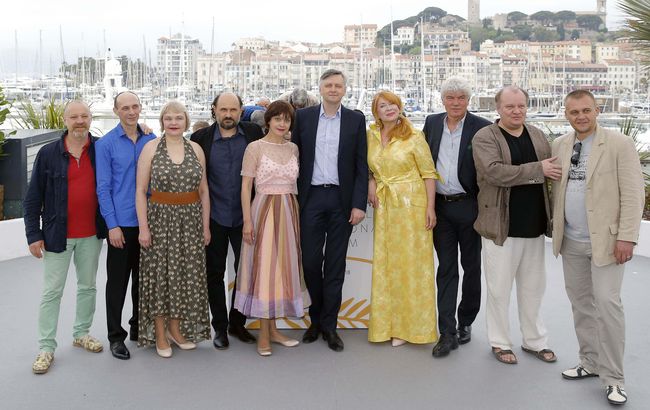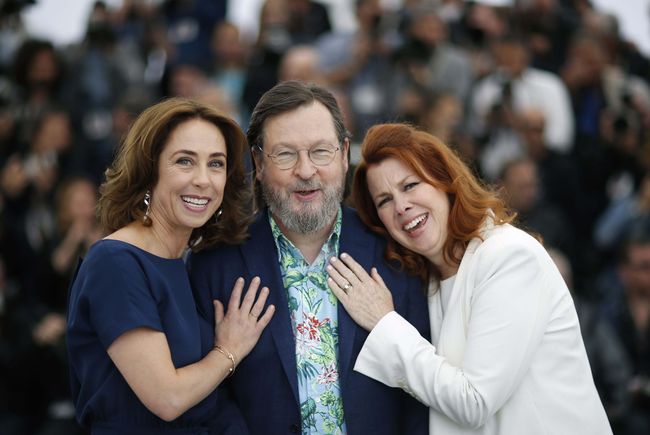The house that Lars von Trier built
The 71st Cannes Film Festival is over and, I must say, it was far from being really successful if compared to the previous ones
CANNES – It is unclear why it so happened: maybe the film art is really starting to fade, and the geniuses of the past have become tired, or the selection team could not find anything new, or the administration lacked an elementary taste and understanding of the socio-cultural situation as a whole...
Maybe it was all of that. Unfortunately…
For example, look at much-discussed Donbass (directed by Serhii Loznytsia): it is not very clear why it was not included in the main competition, if, of course, we are to believe that it is Cannes that is always at the forefront of both cinematographic thought and relevance.
This is a subtle point: relevance alone is not enough, just as it is not enough to be a woman to get into the competition (I am hinting here at the protest of Cate Blanchett and other VIP ladies against the dominance of “male culture,” which they held during the festival, and which was a quite ridiculous sight).
However, Donbass meets all these criteria: it is an artistic work, not a piece of agitprop, as many people think. What many people take for grotesque and exaggeration is, unfortunately, almost documentary truth. However, why did I say “almost”? This is the truth: the Donetsk People’s Republic’s fake news, and the shooting of participants in this comedy, hired to pose as victims of Ukrainian “wanton brutality” (recall the crucified boy, please), and the wedding of a Motorola-like character, and the man tied to a pole and left at the mercy of a crowd of Russian “patriots.”
Nevertheless, even Russian critics familiar with the situation have found that “this is too much.” Like, the other side had to be heard as well. However, Loznytsia did just that, showing what the other side is capable of.
It is all right, everyone has spoken.
Another “relevant” film, Lars von Trier’s The House That Jack Built (and he built it from the corpses of his victims, since this Jack is a maniac, a serial killer), also did not make it to the competition.

MARCELLO FONTE WON THE CANNES FESTIVAL’S BEST ACTOR AWARD FOR THE FILM DOGMAN
If you ask me what is so relevant in the film about a maniac, I will tell you: this is not the first time that Trier turns to the topic of internal fascism, and in this he, strangely enough, converges with Loznytsia, even though one tells the story of the Russian-Ukrainian conflict, and the other speaks about our inner demons.
One films in a semi-documentary manner, the other in the guignol style, featuring cruel jokes, trolling, and mockery which almost goes too far.
But it turns out that they speak, in general, about the same thing: about our invincible inner enemy, about our internal collective “Hitler” (Trier spoke more or less about this at a press conference seven years ago, but his words were taken too literally, resulting in him being banned from Cannes for many years).
Meanwhile, the main competition included some frankly weak pictures, and sometimes even worse ones, which were still weak, but not frankly so: that is, some fakes, semblances of true art, or, as smart people have it, simulacra.
Moreover, these same simulacra got awards – for example, Spike Lee for the film BlacKkKlansman. This is despite the film being devoid of any drive and similar to a regular Hollywood genre picture.
Meanwhile, Italian Alice Rohrwacher, who presented Happy as Lazzaro, which is an amazingly subtle, charming and highly cultured picture, as well as a very original one, received a much too modest accolade. No prize was awarded to Korean Lee Chang-dong, who is an absolute film genius, a major, if not a great director: this is in spite of everyone thinking that precisely he was highly likely to win the gold.

DANISH FILM DIRECTOR LARS VON TRIER APPEARED ON THE RED CARPET NEAR THE PALACE OF FESTIVALS AFTER A SEVEN-YEAR PAUSE. PICTURED: THE DIRECTOR WITH ACTRESSES SOFIE GRABOL AND SIOBHAN FALLON HOGAN WHO TOOK PART IN HIS FILM THE HOUSE THAT JACK BUILT
The mistakes of the main jury (the feeling was that they were engaged in a struggle for life and death, so much that the poor Andrey Zvyagintsev was in an unenviable position on this majority-female jury, which even included female singers, as a result of badly-thought-out selection) were to be offset by hardworking critics: they awarded prizes to Rohrwacher, and Jafar Panahi, and the masterly talented Border by Ali Abbasi.
The only good calls were the prizes for the best actress and best actor. Italian Marcello Fonte was recognized as the best actor, while the best actress prize went to Samal Yeslyamova, an ethnic Kazakh who played the girl Ayka, a Kyrgyz migrant worker trying to survive in a merciless Moscow.
I already wrote about the fact that the inner theme of the festival is Russia as an evil empire: it is felt in Kirill Serebrennikov’s lyric Summer, which tells about rockers forced to play music in basements, and, of course, in Donbass, and in Woman at War, produced with the participation of Ukraine, and, obviously, in Ayka.
Just like Loznytsia, Sergey Dvortsevoy did not spare anyone: by the way, he targeted not only the Muscovites, who are mostly ethnic Russians, showing them as afflicted with some kind of mournful insensibility, complete indifference to anyone else. No, he also showed some Kyrgyz, who work hand-in-hand with the mafia-like Russian police and oppress their own compatriots. In principle, Dvortsevoy shows a hell on earth, an anti-glamorous Moscow, a horrifying place where the humiliated and insulted huddle in basements, without any hope to escape poverty, humiliation, and even outright pogroms. It shows all these Aykas, these enslaved girls who live unnoticed by the locals, by aged ladies in smart coats – it is no wonder that Ayka wanders about Moscow as an invisible woman, a non-entity, a ghost.
It would seem there is nothing to play here: she hardly speaks, doing so only occasionally and timidly as she asks for work in a low voice. But this is actually the most difficult thing – to recreate the authentic, genuine world of a person who exists at the very bottom of life. This is not some exaggerated acting, limited to two or three colors – grief, happiness, surprise, delight – as it is done in commercial films or TV series.
By the way, Cannes waited until the last for both Donbass and Ayka, as both films were ready just in time for the festival, with Ayka arriving only by May 12.
This, perhaps, is the only thing that reconciles me with the 71st Cannes event.
For, as I have already said, I expected more from it.
And it was not only me.






